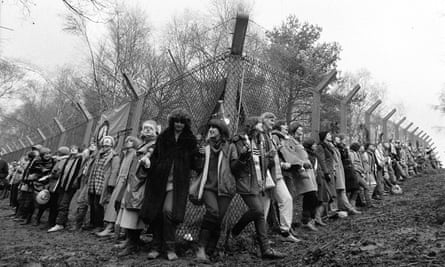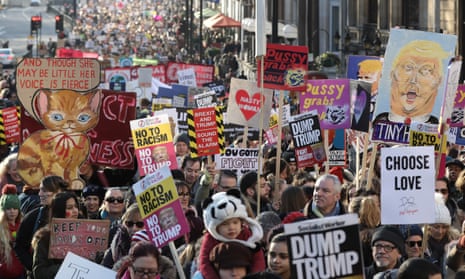Piers Morgan rarely clarifies anything for me, but he did something helpful, vital even, for the Women’s Marches yesterday. I would have gone anyway. I would have gone on a march of Muslims against Trump – or refugees against Trump, or greens against Trump. Nobody who hates the thoughts and deeds of the bigot hates them only on their own account.
However, I was open to arguments about the framing of the marches: is this a good time to start characterising the values of equality and empathy as female ones, exogenous to men – values that the right-thinking man can access only by tapping into his female side? Isn’t it about time to take these values as read, and march as decent human beings against Trump?
Morgan then tweeted: “I’m planning a ‘Men’s March’ to protest at the creeping global emasculation of my gender by rabid feminists. Who’s with me?” All the diffidence and uncertainty lifted, like the rain Donald Trump erroneously claimed to have halted the moment he started talking. (America now has a president who lies about the weather. I would go on a march of meteorologists against Trump, and gladly; lying about demonstrable facts is no trivial thing.)
In Morgan, the disgraced former tabloid editor, we have a man who seems to think that men’s rights are as threatened as women’s; or that a leader can openly despise women for the act of menstruating and that can hang in the air as no big deal, something only a “rabid” feminist would object to; who thinks that a demand for equality and respect is not just violently unreasonable but constitutes an attack on masculinity.
These men exist. They may be parodies of themselves, they may overstate for attention, they may bob and weave, their arguments may be a thin grey stew of bad-faith diversionary tactics (“Look over there! Madonna’s a woman!”) and whataboutery (“I’ll be protesting against Saudi Arabia, they’re the real bad guys … Oh, except I never do protest against Saudi Arabia. You’ll never see me literally outside the embassy”) – but they exist. They are not straw. They are in the ascendancy. They never stop bragging about their victory, but nor do they show any grace in it.
Dignified silence does not shame them. They will take your demand for equality, freedom from sexual violence, reproductive autonomy, respect, and belittle you for it. They will make squirming arguments about how you couldn’t possibly have an authentic political stance because you look middle class – though, lacking curiosity, they will never get close enough to a march to understand its social composition.
They will deliberately mistake solidarity between women for the exclusion of men, because adversarialism is their playground. They like you best when you acquiesce. Now is not the time to worry about the difference between a woman’s right and a human right: it is time to identify the principles you cherish and go into battle for them. That’s why we march, strike one.
Strike two. A small point, really, is that last line of Morgan’s: “Who’s with me?” Nobody’s with him. Were he to organise that march, it would be sparser than a piss-up in a tea shop. He was just kidding! Stupid social media, taking him so literally. But joking or not, he couldn’t get the numbers. The politics of scorn and division can deliver votes, but cannot bring people together in a show of anything. Donald Trump’s crowd could not even fill his bleachers. Nigel Farage’s march on the supreme court was buried for lack of interest. Hope and solidarity literally have more energy, and this is an important thing to remember about human beings, even as that energy struggles to find its structural iteration.

Finally, strike three: mobilising as women, or as pacifists, or as socialists – or as people who blankly can’t believe what the hell just happened – why do we march at all? The rough categories of demonstrating – this is a personal sample, and doesn’t take in hunger marches or marches for suffrage – are these: those with a concrete aim but one so large it never seems achievable (CND, climate marches); those concretely opposing a specific policy (poll tax, Stop the War); and those with vast, systemic objections, but none of them obviously achievable (G8 protests, the Occupy movement). The first are often effective, but only ever as part of a constellation, so it’s always possible to argue that they meant nothing: CND fed into European Nuclear Disarmament, which ultimately contributed to the Intermediate-Range Nuclear Forces Treaty. That would have been an inconceivable result from a field at Greenham Common. It is hard to imagine a bigger success, yet naturally there are people lining up to recount that this had nothing to do with Greenham peaceniks and was due, rather, to two powerful men going for a walk in the woods.
The second category is problematic, even when it does work: you should not have policy made by the people who turn up, any more than you can have policy made by people who lobby or otherwise pay (though we have that too, of course). The third category is the most complex – and the one in which I’d place the Women’s Marches.
I wasn’t there to overthrow the results of the US election, or to persuade Trump’s supporters that they’d done a bad thing. I wasn’t there because I think that the Affordable Care Act will be saved by women, thousands of miles away, defending the right of each other to healthcare. I wasn’t there because I think my right to a world political stage where women aren’t debased for having pussies equates to a Saudi woman’s right to drive. I expect no concrete result, no change of heart, not even the smallest pause or restraint from our own prime minister, who wears a feminist T-shirt one minute and scuttles to the bidding of an open misogynist the next.
I was there because, otherwise, how can we see one another? When we’re refracted through a political and media culture that treats cooperation as schmaltz, equality as passe, honesty as optional, and dissenters as raging weirdos, how other than by congregating can we believe that we’re not alone?
Also, it is fun. I’d forgotten that about protests. “Protest” was never the right word: indeed, was wilfully wrong. It’s a celebration of love among strangers. To despise this, to try and tweet it into submission – you might as well throw an egg at a couple snogging on a bridge.

